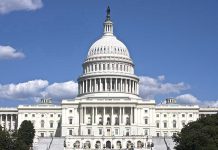
The removal of the rainbow crosswalk at Orlando’s Pulse nightclub reveals how federal and state action is pushing back against the use of public spaces for political messaging—drawing a clear line on what is allowed on our roads and who gets to decide.
Story Snapshot
- The Florida Department of Transportation (FDOT) removed the rainbow crosswalk at Pulse, citing new federal and state directives against political road art.
- Governor DeSantis defended the move, stating roads will not be “commandeered for political purposes.”
- Local officials and LGBTQ+ advocates condemned the action as erasing a memorial to mass shooting victims.
- The event highlights ongoing tension between federal/state authority and local autonomy over public spaces.
Federal and State Crackdown on Political Road Markings
The FDOT painted over the rainbow crosswalk outside Orlando’s Pulse nightclub, following a directive issued by the Trump administration aimed at removing “distracting” and politically themed road art nationwide. The federal policy, implemented by Transportation Secretary Sean Duffy, instructed states to enforce uniform road standards and eliminate non-standard markings that could be interpreted as political statements. Florida’s action was one of the first high-profile enforcements, signaling a coordinated effort to restore what officials describe as neutrality and safety to public infrastructure.
The Pulse crosswalk, installed in 2017 after community petition and FDOT approval, had become a symbol of LGBTQ+ pride and a memorial to the 49 lives lost in the 2016 mass shooting. Its removal triggered immediate backlash from Orlando officials and LGBTQ+ groups, who organized protests and condemned what they saw as erasure of a significant community tribute. Despite the outcry, state leaders maintained that allowing political or identity-based symbols on state property opened the door to further politicization and undermined both the neutrality and safety of public roadways.
DeSantis and the State’s Justification: Neutrality, Safety, and Constitutional Concerns
Governor Ron DeSantis publicly defended the FDOT’s removal of the crosswalk, asserting that Florida’s roads must not be “commandeered for political purposes.” This stance aligns with the Trump administration’s broader push to remove perceived political messaging from public infrastructure, emphasizing the need to keep taxpayer-funded spaces neutral. State officials argued that such measures are essential to uphold the rule of law, avoid government overreach into political advocacy, and prevent roads from becoming battlegrounds for social or partisan causes. This message resonated with many who support returning control over public spaces to elected leaders rather than activist groups.
At the same time, DeSantis’s position underscored a broader conservative concern: that leftist agendas and identity politics have increasingly infiltrated public spaces under the guise of inclusivity or memorialization. By enforcing clear guidelines and removing non-standard markings, state leaders argue they are protecting constitutional principles, preventing government resources from being used to advance divisive or radical agendas, and reinforcing the primacy of the law over activist demands.
Local Autonomy, Backlash, and the Future of Public Memorials
Orlando city officials, including the mayor, sharply criticized the removal, insisting that memorials like the Pulse crosswalk represent legitimate local expression and remembrance. LGBTQ+ advocacy groups and survivors of the Pulse tragedy led public demonstrations, arguing that the state’s action was not just a technical enforcement of road policy but a targeted erasure of a marginalized community’s visibility and grief. This clash has reignited debates over the limits of state and federal power versus local autonomy and the role of public spaces in reflecting diverse histories and identities.
While the FDOT’s action remains in place and the rainbow crosswalk has not been restored as of August 24, the controversy highlights the broader national trend of conservative-led governments reasserting control over public spaces to prevent what they view as government-sanctioned political messaging. The outcome in Orlando may set precedents for how other memorials and symbols are treated across the country, raising questions about the future of local tributes and the boundaries of free expression on taxpayer-funded property.
Expert Perspectives on Road Policy, Memorialization, and Community Identity
Urban planning and transportation experts generally support standardized road markings for safety and uniformity, but acknowledge that public art can play a significant role in community healing and identity. Academic voices in public policy and LGBTQ+ studies warn that removing such memorials may deepen societal divisions and harm already vulnerable communities. The debate in Orlando demonstrates how issues of safety, neutrality, and constitutional government intersect with local efforts to honor tragedy and promote visibility for marginalized groups. The handling of the Pulse crosswalk now serves as a focal point in the broader national conversation over who decides what belongs in public spaces, and under what authority.
DeSantis on Removal of Rainbow Crosswalk: Roads Will Not Be ‘Commandeered for Political Purposes‘ https://t.co/efGiCiL8cE via @BreitbartNews
— Moving the Agenda Forward ! (@TheStretch71) August 24, 2025
Ultimately, the removal of the Pulse rainbow crosswalk underscores the renewed conservative emphasis on restoring traditional values, limiting government overreach, and ensuring that public property is not repurposed for ideological causes—while also exposing the complex interplay between community memory and the law.
Sources:
Rainbow crosswalk repainted outside Pulse; Florida troopers seen standing by
Crowd gathers to protest FDOT’s removal of rainbow crosswalk at Pulse site
Rainbow returns to Orlando crosswalk after Florida paints over tribute to Pulse victims


















